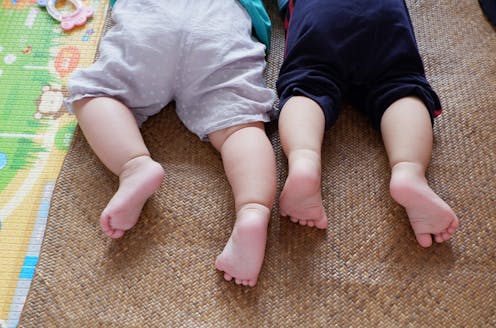Worried about sending your baby to daycare? Our research shows they like being in groups
- Written by Ben Bradley, Professor Emeritus (Psychology), Charles Sturt University

When parents are starting their babies in daycare, a common concern is whether it is good for little ones to be away from their primary carers for long periods of time.
But as our recent book Babies in Groups shows, babies as young as six months respond to and enjoy being in groups with other babies.
This can reassure parents their child will gain something at daycare they are mostly missing at home: opportunities to enjoy supervised time in small groups of their peers – eating, learning and playing together.
Our prehistoric ancestors lived, foraged, hunted, defended themselves, and brought up their young in groups. So, it makes sense today’s babies are born with a capacity to enjoy spending time together.
Previous research
Nearly all previous research about babies’ social and emotional development focuses on their relations with adults (typically their mothers) and almost always studied in pairs.
But as we explain in our book, this is because researchers’ assumptions mostly reflect ideas entrenched in Western cultures that make the stay-at-home mother the be-all and end-all for a baby’s healthy development.
Anyone who watches how babies act in larger families, playgrounds, or parent groups, soon sees how attuned they are to group dynamics, especially when around infants like themselves.
Our research
For 25 years we have been researching whether babies are born already adapted to life in groups. Or whether this capacity only develops after they form their first infant-to-adult bond (as existing theory predicts).
Over several studies included in our book, we invited 51 six- to nine-month-olds – previously unknown to each other – into our recording studios. Here we arranged stationary baby chairs into triangles for groups of three or squares for groups of four.
Once parents had fastened their babies into a chair, all adults left the studio and the cameras rolled.
In previous research psychologists found strapping a babies of this age into a chair in a sterile recording studio with just their mum to talk to usually produced a frustrated baby within a minute or two – unless mum entertained her baby with games or toys.
But we found if you introduce babies to two or three other unfamiliar babies the group can run happily for anything up to 25 minutes, even though there are no toys to play with.
Our films show how babies in these groups use many types of communication at once: touching, vocalising, gesturing, changing postures, imitating each other, looking both directly at one another or out of the corners of their eyes, sharing rhythms vocally or by making noises with their hands, plus making a great variety of facial expressions.
This means babies can communicate with several other babies simultaneously. An eight-month-old may start a tentative game of footsie with one while looking at another and banging on the table in time with a third.
Over several minutes quite complex interactions develop. Babies invent games and create forms of music together. If two babies are getting friendly, a third may butt in by making a loud noise to distract them from linking with each other.
Alternatively, if a baby cries, its fellow group-members will likely try to comfort her or him, often successfully – by looking and vocalising, or waving towards, or leaning over and reaching towards, or touching the distressed baby.
This shows us babies have a competence in groups well before they have worked out how to maintain one-to-one attachments to adults. These first appear around eight months of age and continue to develop throughout the second year of life.
What does this mean for daycare centres?
This finding has important implications for babies going to daycare and other early childhood services.
We have seen how centres which organise babies into groups can be less stressful for infants – and educators – than when the top priority is to forge one-to-one bonds between infants and educators.
For example, when several babies are lined up to be fed one-to-one by an educator, mealtimes soon end in tears. Put highchairs in small circles and mealtimes last for up to forty minutes of conversation, imitation and laughter.
So, for parents thinking about how to develop and care for their young child, look for centres which acknowledge and promote babies’ normal interest, pleasure and capacity to engage with others of their own age.
And don’t be worried that you are doing something “bad” for your baby by sending them to be with other children of the same age.
And for all those raising babies at home, the more infants involved in your baby’s life – whether they be cousins or friends made in playgroups – the better for your baby and the better for you.
Authors: Ben Bradley, Professor Emeritus (Psychology), Charles Sturt University




